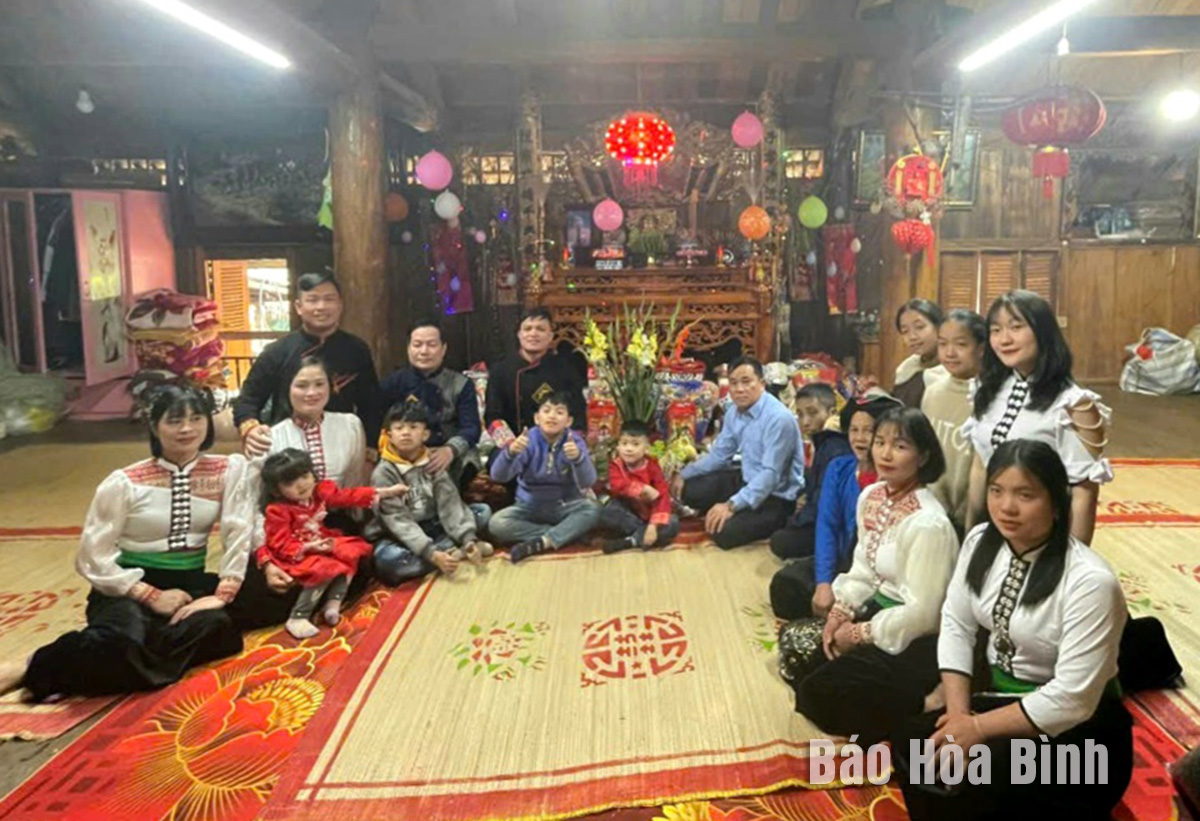
During this Lunar New Year (Tet), residents of Vay Nua commune, Da Bac district are joyfully celebrating the arrival of spring with various festive activities. Along the main road of the commune, a newly installed solar-powered streetlight system stands out, completed just before Tet. Funded by Agribank Hoa Binh with a total investment of approximately 80 million VND (over 3,100 USD), the project has already proven beneficial. Not only does it enhance the rural landscape, but it also improves road safety and security, adding to the New Year’s cheer for the people of Vay Nua.
Tet is a meaningful time for family reunions in Muong Chieng commune, filling the spring with warmth and love.
Ahead of the Lunar New Year, Trinh Duc Thang, Deputy Director and Chairman of the trade union at Agribank Hoa Binh, visited Da Bac to present 50 Tet gift packages to disadvantaged households in Tien Phong commune. The bank has been supporting Vay Nua and Tien Phong communes for 15 years, offering practical Tet gifts each year to help ease hardships and bring festive joy to local families.
At Yen Hoa Primary and Secondary School, the bank has funded the construction of a dormitory and supporting facilities, with a total investment of 4 billion VND.
The mountainous district of Da Bac is home to various ethnic groups, with nearly 90% of the population belonging to the Tay, Muong, Dao, and Thai communities. While each group has its own traditions and cultural values, they share a strong bond of unity, creating a rich and diverse heritage. Among them, the Tay people are making significant efforts to preserve their unique cultural identity, which is especially evident during the Lunar New Year.
Tet is not just a time for family reunions but also an occasion to host meaningful events that reflect the rich traditions of the Tay people. A notable example is the Le Ta on thay Mot Lao (Thanksgiving Ceremony for Master Mot Lao), a spiritual ritual expressing deep gratitude to the traditional healer who once performed rituals to restore well-being. While modern healthcare has replaced many old practices, the role of Master Mot Lao remains significant in blessing and safeguarding the community.
Another distinctive Tay tradition during Tet is the Xen Ban, Xen Muong festival. "Xen" means "praying," and the festival typically takes place on the 6th or 8th day of the Lunar New Year, depending on the locality. According to ancient records, Xen Ban is a village-level event where offerings include pork, chicken, duck, and fish from streams or ponds.Xen Muong, held at a regional level, involves a larger-scale ceremony with buffalo sacrifices. Today, parts of the Tay community in Da Bac still preserve the Xen Ban festival, which honours the early settlers who transformed uninhabited lands into thriving villages. The event also serves as a prayer for a peaceful and prosperous year ahead. The government encourages the continuation of such traditions, fostering cultural preservation and community spirit.
Visiting Da Bac during the spring, particularly in Tay-majority areas like Vay Nua and Muong Chieng, one can experience an atmosphere filled with joy and cultural vibrancy. Local residents eagerly welcome the new year with community gatherings and traditional folk games such as stick pushing, tug-of-war, con throwing, and crossbow shooting. These activities create an exuberant and festive ambiance, ushering in a year of harmony and prosperity.
Hoa Binh province is undergoing a dynamic transformation amid Vietnam’s national digital transition. Building on Poliburo’s Resolution No. 57-NQ/TW on breakthroughs in science, technology, innovation, and national digital transformation, the province has rolled out a wide range of practical action plans. A standout initiative is the "Digital Literacy for All” movement, an effort to ensure that no one is left behind in the digital era.
Hoa Binh province is undergoing a dynamic transformation in the wake of the national digital transformation movement. Building on Resolution No. 57-NQ/TW of the Politburo on breakthroughs in science, technology, innovation, and national digital transformation, the province has implemented a wide range of practical action plans. A standout initiative is the "Digital Literacy for All” movement ambitious effort to ensure that no one is left behind in the digital age.
With a spirit of unity and proactive problem-solving, the Party Committee, the government and the people of Dong Lai Commune (Tan Lac District) have made great strides in implementing the resolutions of the 24th Party Congress of the commune for the 2020 - 2025 term. Focusing on leadership and practical actions, the commune has brought the Party’s resolutions into daily life, creating strong impacts and pushing the local development forward.
Amid the nationwide push for digital transformation, young people in Hoa Binh Province are stepping up as dynamic pioneers, applying technology to enhance Youth Union operations and expand the reach of youth-led initiatives. Through creativity and adaptability, Youth Union organizations at all levels have introduced a series of practical solutions, contributing to modern governance and community development.
In recent years, An Nghia commune, located in Lac Son district, has stepped up administrative reform, focusing on improving the quality and efficiency of its single-window service unit for receiving and processing administrative procedures. These improvements have helped create favourable conditions for local residents and organisations to handle administrative procedures, contributing to the commune’s broader socio-economic development.
The Prime Minister-approved master plan to develop the multi-use value of forests ecosystems through 2030, with a vision to 2050, aims to improve the management and sustainable use of forest resources, create jobs, increase incomes, and improve the living standards of ethnic minorities, people in mountainous and remote areas, forest workers and those living near forests.



